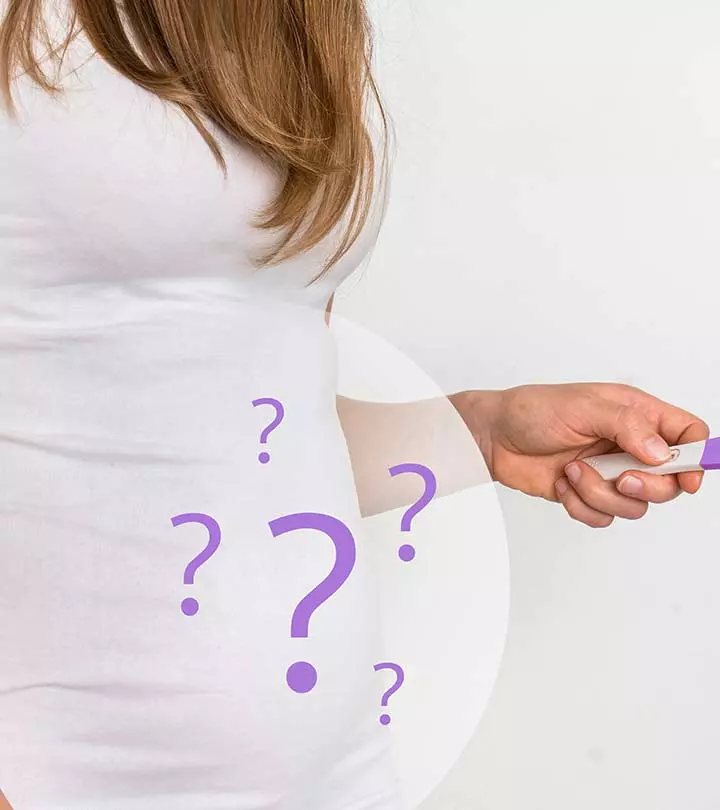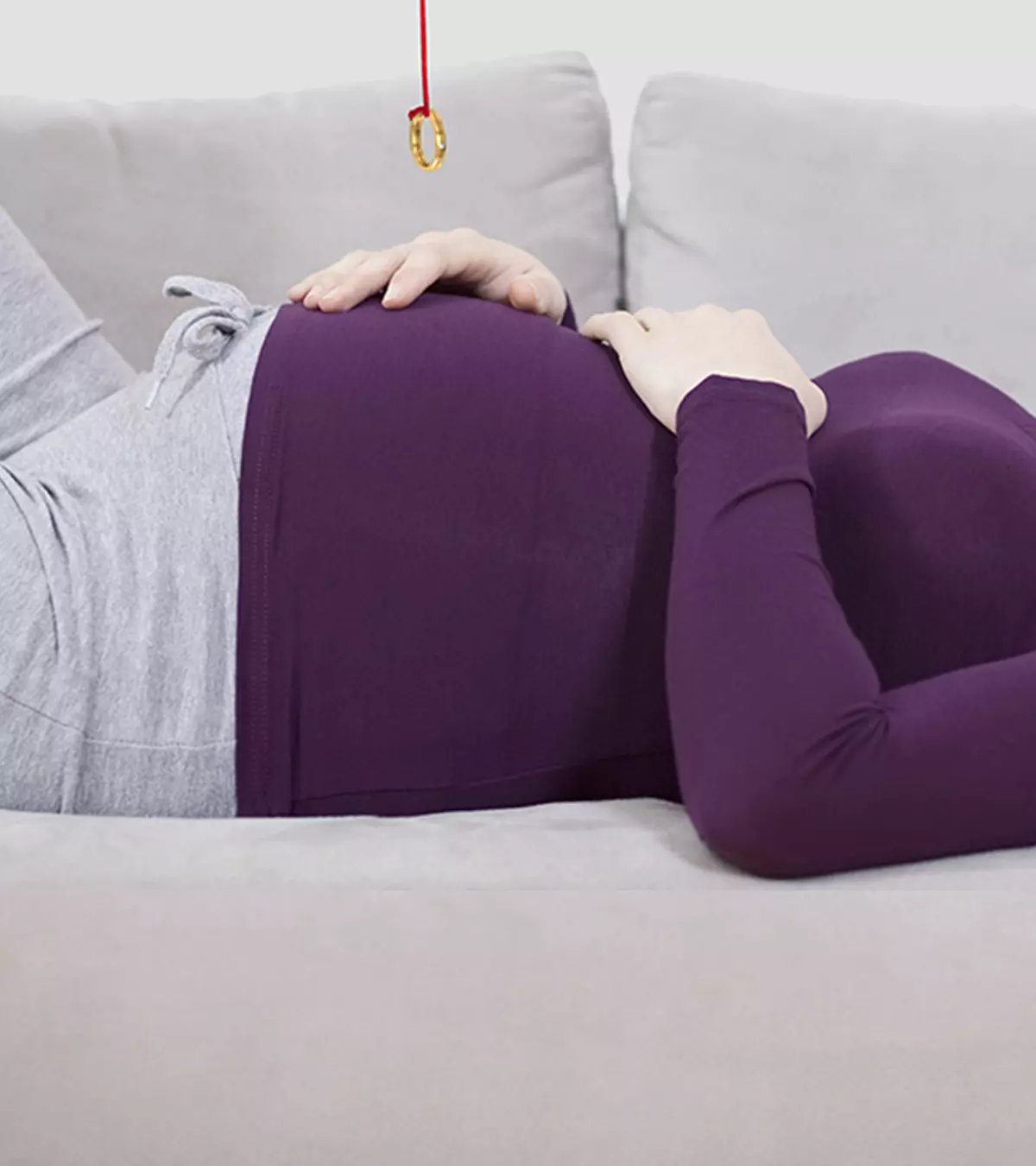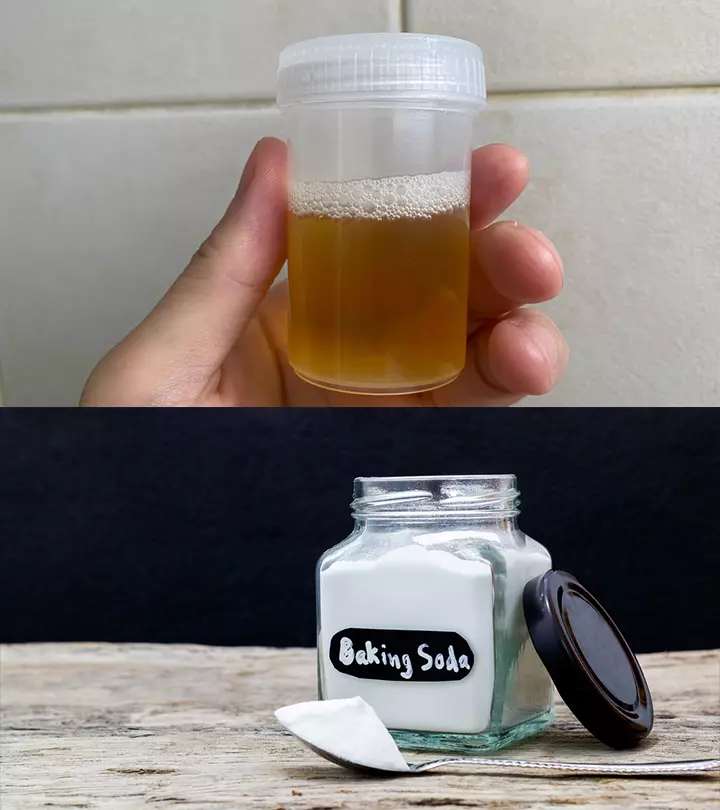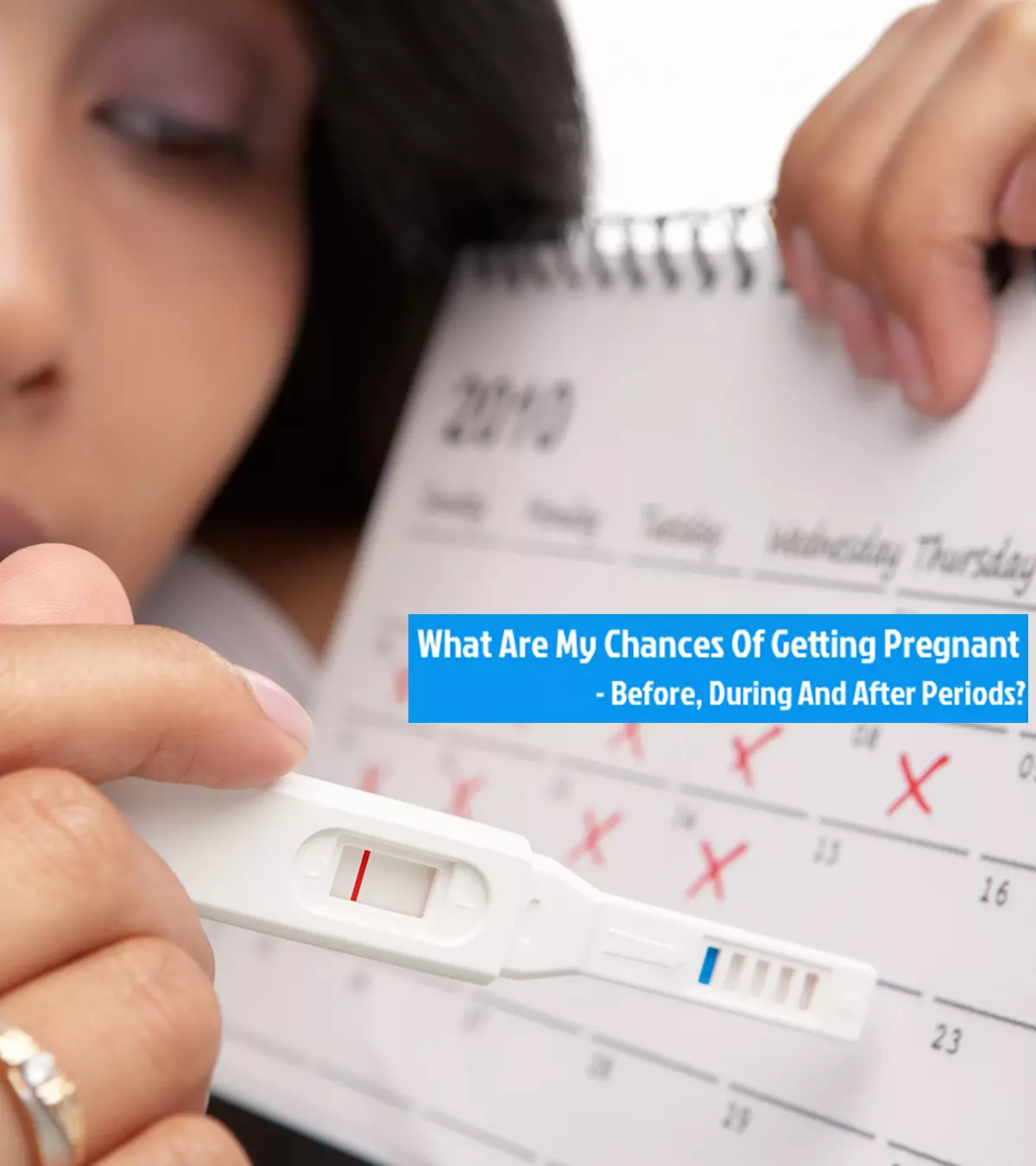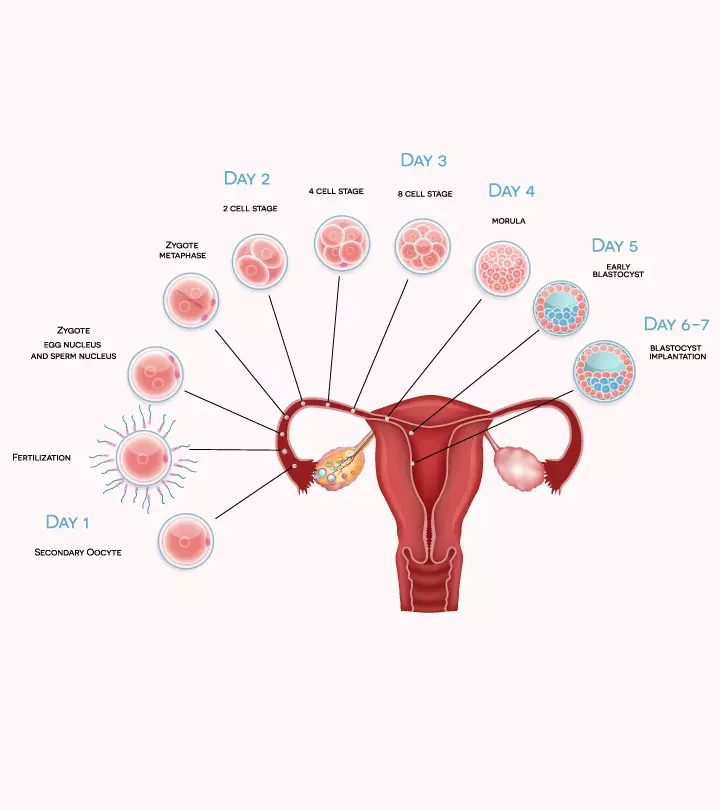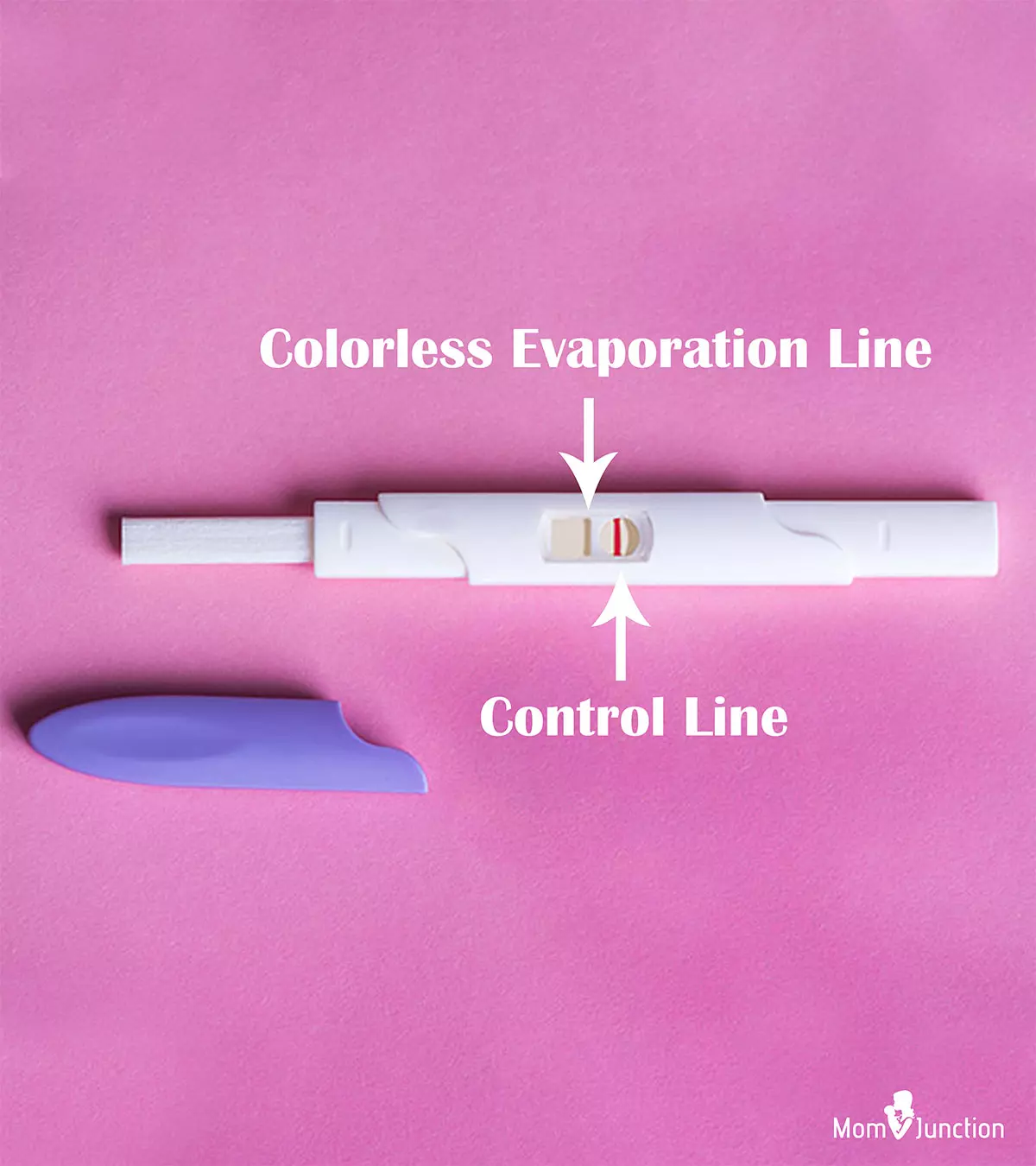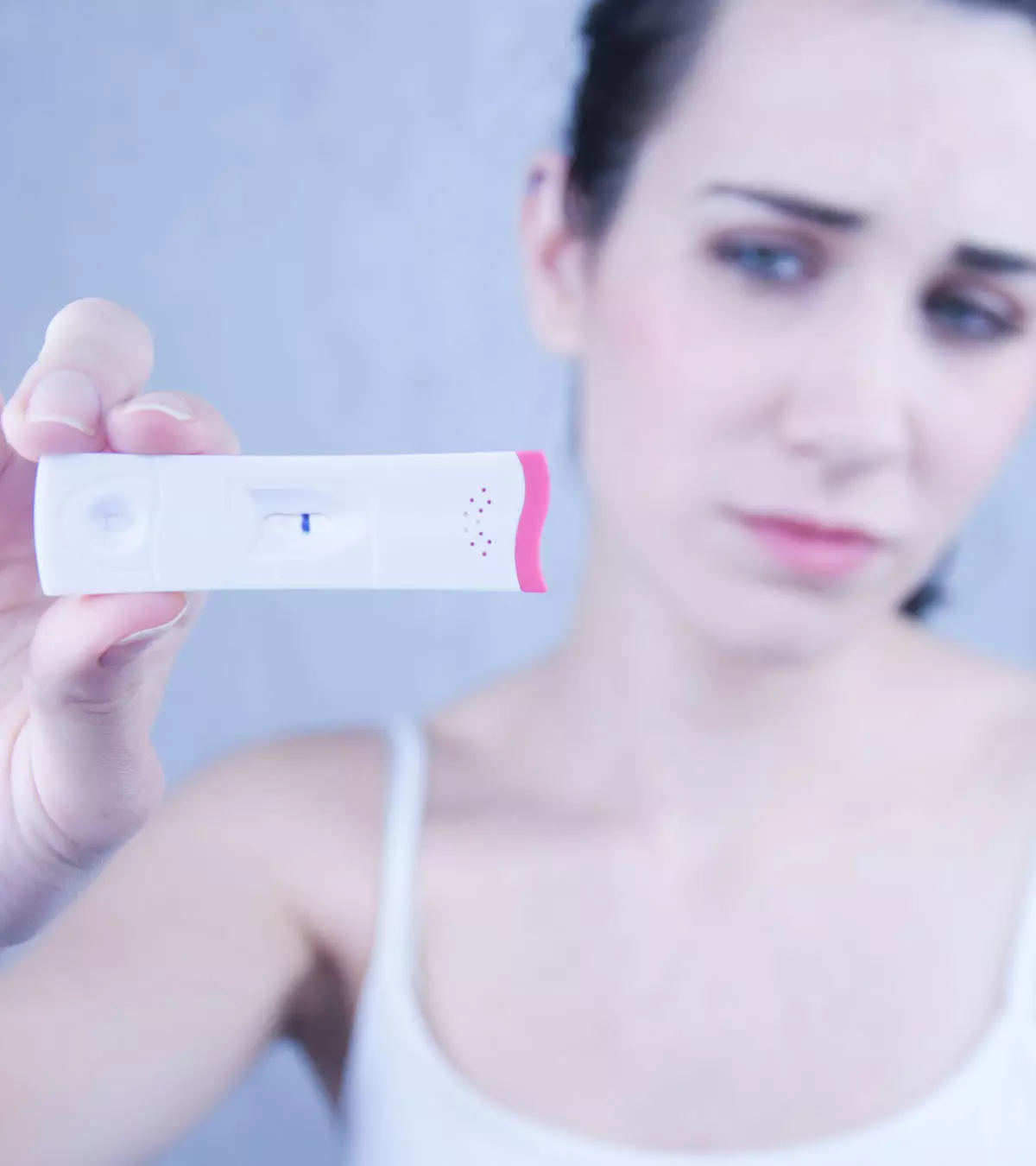
Image: ShutterStock
A home pregnancy test (HPT) is often useful to know about pregnancy immediately. Many women prefer this test since it provides you with the answer in the privacy of your own house. But what if we told you that there are chances of experiencing a false-positive home pregnancy test result? Yes, this is possible and may lead to lots of confusion. While false-positive results are extremely rare, they do happen, and there might be various reasons behind them. Keep reading this post to learn more about HPT, as well as some of the reasons for false-positive results and how to avoid them.
Key Pointers
- A home pregnancy test detects the presence of Human Chorionic Gonadotropin (hCG), a hormone produced during pregnancy.
- Fertility treatments or improper testing are common causes of false positives.
- Incorrect timing, using expired tests, or a contaminated urine sample can also lead to false positives.
- Less common causes of false positives include certain medical conditions, medications, or chemical pregnancy.
- To confirm pregnancy, a doctor’s consultation and a blood test can provide a more accurate result.
How Does HPT Work?

Before you try and understand why you can get a false home pregnancy test, it is first important to comprehend how an HPT works.
When you are pregnant, your body produces a hormone called Human Human Chorionic GonadotropiniA hormone produced by the placenta during pregnancy to sustain the pregnancy and nourish the fertilized egg. (HCG), the pregnancy hormone. A home pregnancy test or urine test checks for this very hormone in your body. If there is a substantial amount of hCG in your body, it passes on to your urine and gives you a positive pregnancy test (1).
 Quick fact
Quick factWhy Does A False Positive Home Pregnancy Test Happen?
A false positive, or a positive HPT without being pregnant is rare. But when it does happen, the following reasons may be at work:
1. Fertility treatment
Infertility can be devastating. And if you get a false positive while you are struggling to conceive, it can almost break your spirit. But if you are undergoing fertility treatment that requires hCG shots, it is possible to get a false positive. It is because the HPT ends up detecting the remnants of the hCG shot in your body (2).
2. Evaporation line
Some pregnancy tests leave an evaporation line when the urine runs across the test strip. Usually when the urine passes, it changes in color, thereby helping you locate the test results. If the test is positive, it will change in color and have a line at the proper testing time. But if you observe no line and it requires you to manipulate the light to observe the line properly, it may be an evaporation line. This line may sometimes appear as a faint line on a pregnancy test. It can also happen when you check the result after 10 minutes (3).
3. Improper testing
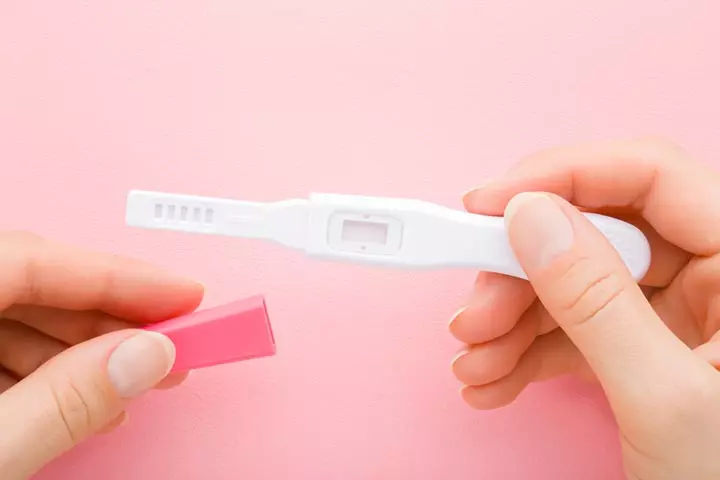
Most women who show a positive pregnancy test will be pregnant and a few are not. The primary cause of a false positive pregnancy test is that you may not read the test correctly. Pregnancy home tests will have certain instructions that you need to follow correctly. It is important to read the manufacturer’s instructions before taking a pregnancy test. Most test kits require you to read the test after exactly 3 minutes and not to read if it crosses 10 minutes. Once you read the test to be negative after 3 to 5 minutes, you should throw away the test. Any positive test that shows after the time goes inaccurate cannot be considered right (3).
It is very important to follow the instructions given on the HPT. If you fail to do so, you may end up getting your hopes up only to see them break into pieces later!
Rylee Jade, a vlogger, had conducted multiple pregnancy tests at her home to detect pregnancy. She says, “I just called the doctor, and I told her that I have two positive tests and two negative tests. She said to come in for blood work, and now I feel conflicted.” However, she later confirms, “My doctor called me and informed me I am not pregnant (i).”
 Experts say
Experts say4. Chemical pregnancy
It is one of the most heartbreaking causes for a false positive. For the briefest of moments, your body is pregnant. But the fetus fails to latch on to the uterus. All this happens, many times, before you miss your period. Many times, what many women consider to be a late period or an irregular menstrual cycle, is the end of a chemical pregnancy. Your chances of getting a false positive due to a chemical pregnancy go up if you test before your period date (4).
 Point to consider
Point to consider5. Certain medical conditions
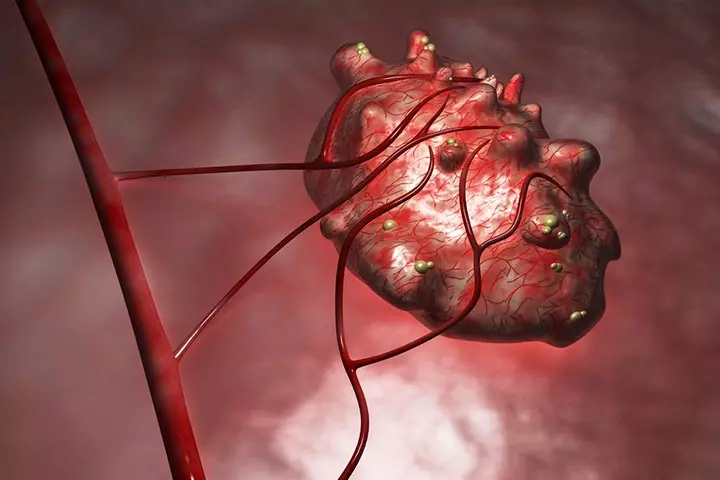
Though it is not common, some medical conditions can cause a false positive pregnancy result. Ectopic pregnancy, menopause, ovarian cysts and some rare medical conditions can give misleading results. Certain forms of cancers like choriocarcinoma (cancer found in the uterus), breast, ovarian and testicular cancers can produce hCG leading to a false positive result (5).
6. Medications
If you are taking certain medications, such as methadone, chlordiazepoxide, or promethazine, you may experience false positive pregnancy tests (3). Women receiving hCG shots or any other fertility treatment should consult their health care provider about the accuracy of the home pregnancy tests. The reason is the medications can interfere with the test results by contaminating the urine with blood or gross amounts of drugs.
7. Faulty pregnancy test
Before you use an HPT, check its expiration date. Many false positives are a result of tests that had passed their use by time. Many times, you may just end up with a faulty pregnancy test, which can give false positives.
A mother of two J Wilson shares her experience with a faulty positive pregnancy test. She went to the ER, where the medical professionals ran some tests. She says, “She (the medical professional) comes back to tell me that my urine results were negative and my HCG results showed close to zero. ‘You were not pregnant, and you haven’t been pregnant any time recently.’
“But what about the positive pregnancy tests? I ask. ‘False Positive. Maybe it was expired? Your period returned,’ she says (ii).” It took Wilson some time to come to terms with the fact, but she then accepted the fact that she was not pregnant.
8. Contaminated urine sample
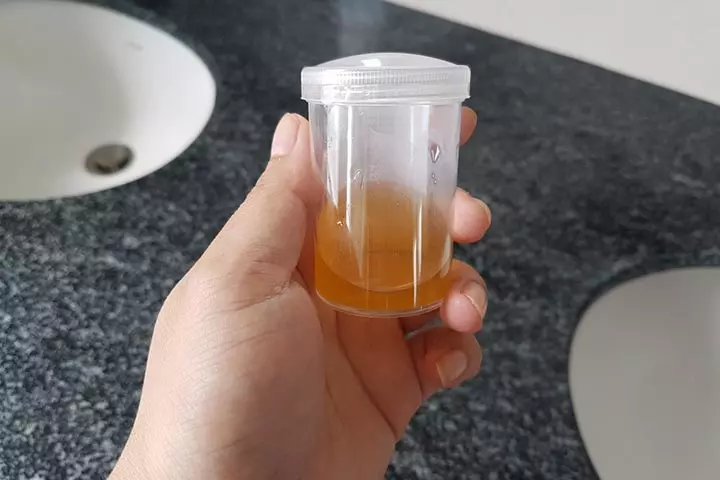
Some pregnancy test kits usually come with cups. Washing the cup may contaminate the urine sample if you do not wash all the soap or detergent before the test. You should note that these cups are sterile and do not require any washing before using them.
9. Pituitary hCG
The human pituitary gland produces low levels of hCG (6). The hormone is more commonly detected in menopausal women. So, if you are over 40 and get a false pregnancy test, you can blame your pituitary gland for it!
10. Tubo-ovarian abscess
Some women with tubo-ovarian abscessiAn inflammatory mass filled with pus that occurs due to an infection in the fallopian tube and ovaries. too can experience false positive HPTs (7). Women who are suffering from pelvic pelvic inflammatory diseaseiAn infection of the female reproductive organs caused by STDs and other infections resulting in lower abdominal pain. often experience this serious reproductive health issue.
11. Antibodies
Some women possess antibodies in their blood, such as heterophile antibodyiWeak antibodies or proteins produced by the white blood cells. , that can interfere with an HPT and give false positives (7). According to an American College of Obstetricians and Gynecologists (ACOG) study, women working in animal-based laboratories, animal-rearing farms, or veterinary settings are more likely to have heterophilic antibodies in their serum (17).
12. Hemodialysis
If you are suffering from a renal disease and undergoing HemodialysisiThe process where blood is removed from the body using a machine, filtered, and transferred back. , you may experience a case of a false positive pregnancy test (8).
 Quick tip
Quick tipCommon User Errors
Many women may inadvertently make mistakes when taking home pregnancy tests, leading to false positives. Common errors include not following the instructions precisely, such as reading the test too late, using an expired test, or failing to test at the recommended time. Being aware of these potential pitfalls can help ensure more accurate results.
Dr. Jonathan Emery, MD, from the Department of Obstetrics and Gynecology at Cleveland Clinic’s Willoughby Hills Family Health Center, states that not following the test kit’s instructions correctly, including small details like the number of urine drops and waiting too long to read the results, can lead to errors (2).
How To Avoid A False Positive Test Result?
False positive pregnancy results are rare. Most of the women’s health experts recommend going for at least two home pregnancy tests to confirm your pregnancy. Trying different brands can reduce the likelihood of misreading the results.
Most home pregnancy tests show 99% effective results if you follow the directions correctly. But you should also remember that the positive test can be misleading sometimes. Also, knowing when to take a pregnancy test can make a huge difference in accuracy. It would be best if you wait until you have missed a period and then take the test. Taking the test in the morning gives accurate results since hCG levels are highest in the morning time. Experts at the National Institute of Health advise checking the test kit’s expiration date and using a timer to ensure accurate results since an expired kit or incorrect timing can lead to errors (13).
 Research finds
Research findsConsulting a Healthcare Provider
If you experience confusion regarding your pregnancy test results, it is vital to consult a healthcare provider. They can perform more sensitive blood tests and offer guidance on the next steps. Seeking professional advice ensures a comprehensive understanding of your situation and helps in receiving appropriate care.
Frequently Asked Questions
1. Can a UTI cause a false positive pregnancy test?
Yes. Severe urinary tract infections with high levels of white blood cells (WBCs), red blood cells (RBCs), and nitrite can occasionally result in a false positive pregnancy test (9).
2. How many pregnancy tests should I take after a positive?
If you get a positive pregnancy test result, you usually don’t need to repeat the test because home pregnancy test kits have a 99% accuracy rate. You can directly make an appointment with an obstetrician. However, many women choose to repeat the test just to be sure.
3. Can hormonal imbalance cause false positive pregnancy tests?
Yes. Hormonal imbalance of hCG due to factors such as ectopic pregnancy, pituitary hCG in menopausal women, miscarriage, trophoblastic diseaseiA rare disease in which tumors develop inside the uterus in early pregnancy. , and phantom hCG may result in a false positive pregnancy test (10).
4. Can kidney stones cause a false positive pregnancy test?
Yes. A case study conducted by Rahul Mital et al. (2020) reported that false positive pregnancy tests could be associated with obstructive pyelonephritis caused by kidney calculus (kidney stone) (11).
5. Are there any other tests that can be done to confirm a false positive home pregnancy test result?
If you are uncertain about the positive result from your pregnancy test at home, you can confirm it with lab testing, such as a blood test. You need to visit a provider’s office or a lab to get the test done. These tests can find small amounts of hCG in blood and return highly accurate results (13).
6. Can drinking too much water affect the accuracy of a home pregnancy test?
Yes, drinking too much water can dilute your urine and reduce the concentration of hCG. This may lead to a false negative result (showing a negative result when you are actually pregnant) (14).
7. Can stress cause a false positive test result?
Stress may not directly impact test results. However, it can disrupt your menstrual cycle, potentially leading to confusion about your pregnancy status. If you are unsure, consider retaking the test or consulting a doctor (19) (20).
8. What steps should I take if I get a false positive result?
If you receive a false positive result, it is essential to retest with a different brand of home pregnancy test after a few days. If the positive result persists or you have concerns, consult your healthcare provider for further evaluation and blood tests for accurate results.
Although uncommon, false-positive pregnancy results occur, especially when using a home pregnancy test kit. Fertility treatments, inadequate testing, faulty test kits, contaminated urine samples, certain drugs, and medical conditions can impact a false-positive home pregnancy test result. If you want to avoid false positives, follow the directions while taking the test, don’t keep the test, and throw it away if it shows a negative result. Also, if you believe the test is inaccurate, make an appointment for a medical diagnosis with a gynecologist to double-check the result.
Infographic: Avoid Getting A False-Positive Pregnancy Test
A false-positive pregnancy test may lead to unnecessary confusion and diagnosis. Therefore, it is essential to take precautions and get an accurate result. This infographic shares with you some ways of avoiding an inaccurate pregnancy test. Illustration: Momjunction Design Team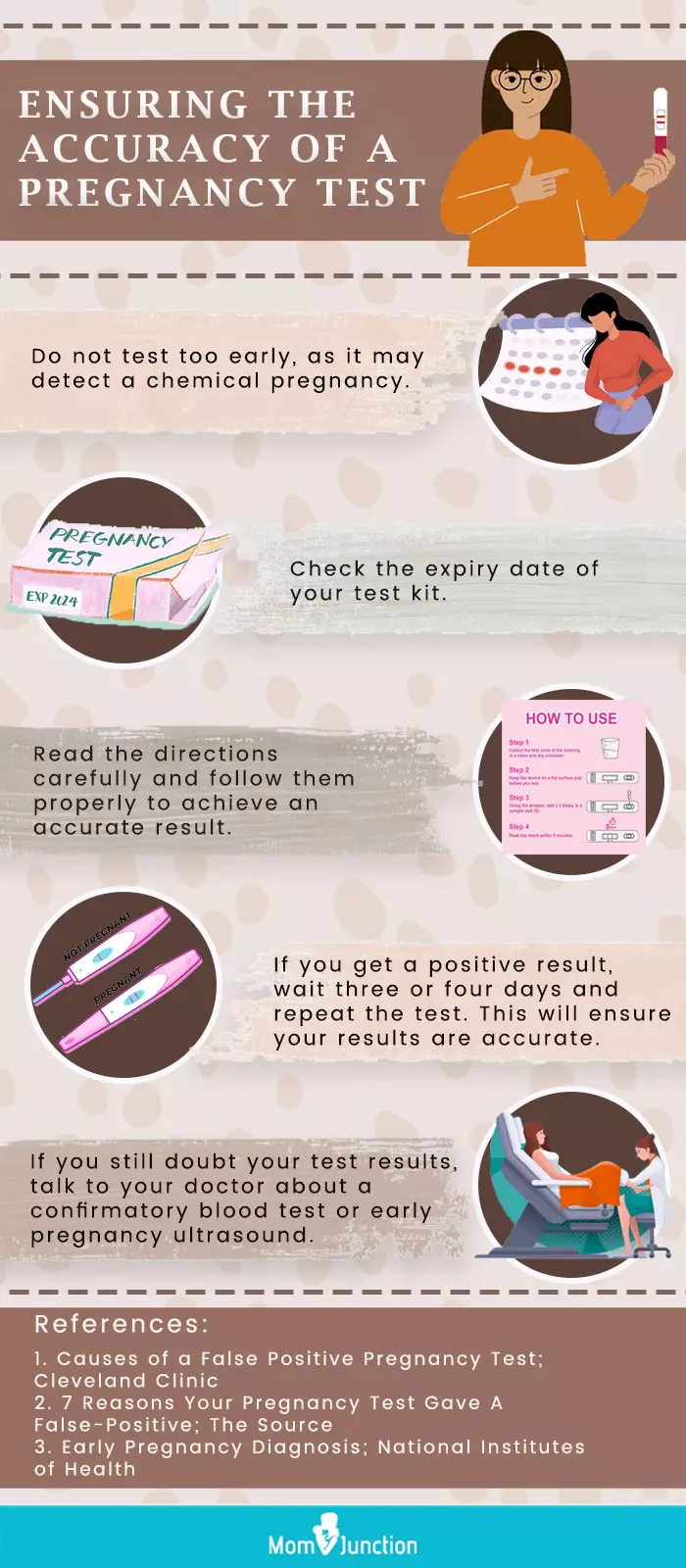
Illustration: Reasons For False Positive Home Pregnancy Tests
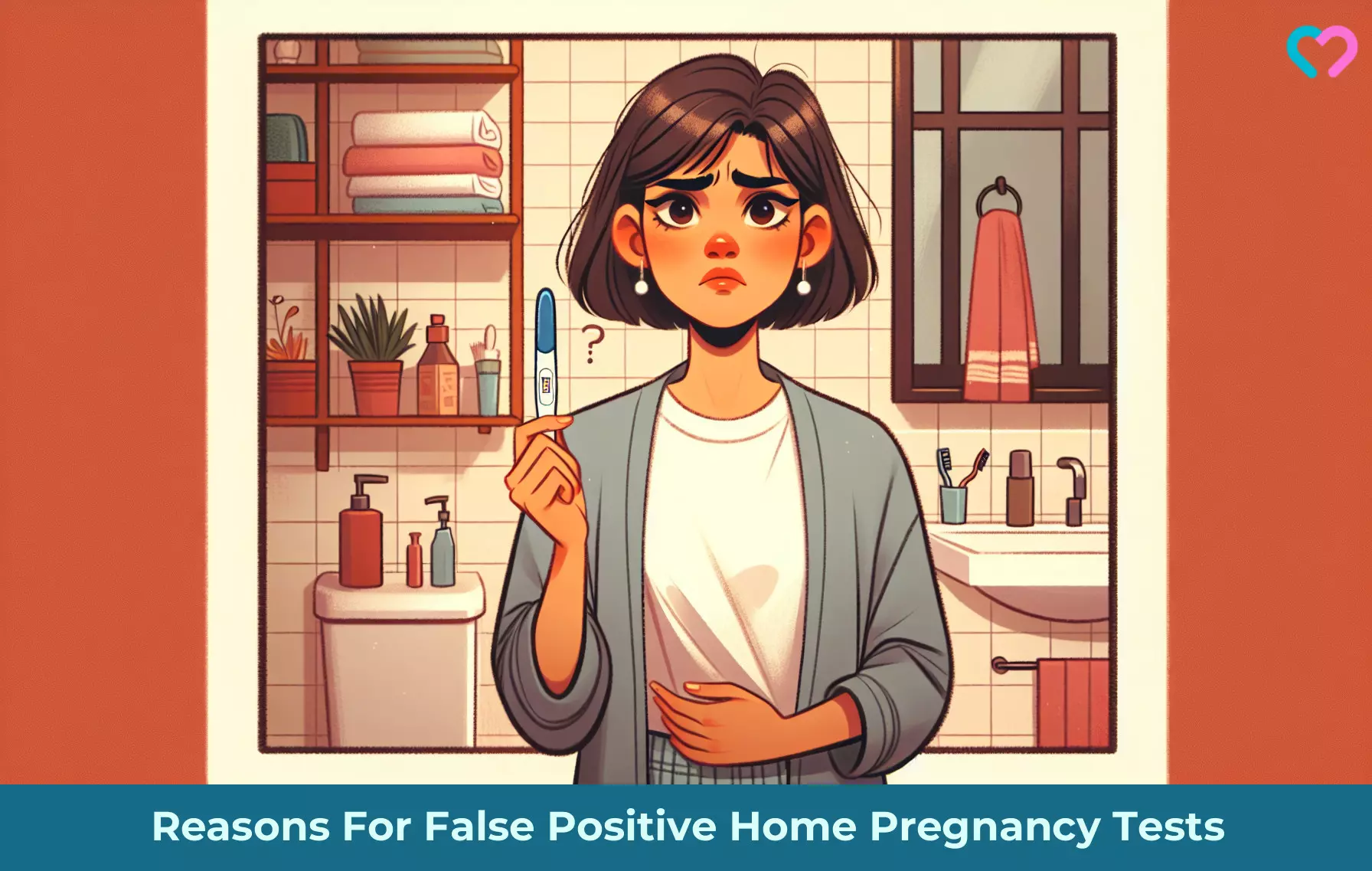
Image: Dall·E/MomJunction Design Team
False positive pregnancy test results can be caused by certain medications, medical conditions, or even a recent miscarriage. Learn more about it in this video.
Personal Experience: Sources
MomJunction articles include first-hand experiences to provide you with better insights through real-life narratives. Here are the sources of personal accounts referenced in this article.
i. False positive pregnancy test | Day in the life Vlog;https://www.youtube.com/watch?v=SiKYOyLkh9A
ii. False positive;
https://medium.com/@J_Wilson/false-positive-6e04a8828390
References
- Pregnancy Tests.
https://www.plannedparenthood.org/learn/pregnancy/pregnancy-tests#:~:text=Pregnancy%20tests%20work%20by%20checking - Causes of a False Positive Pregnancy Test.
https://health.clevelandclinic.org/false-positive-pregnancy-test - 7 Reasons Your Pregnancy Test Gave A False-Positive.
https://www.thesource.org/post/reasons-your-pregnancy-test-gave-a-false-positive - Carolyn B Coulam and Roumen Roussev; (2002); Chemical pregnancies: immunologic and ultrasonographic studies.
https://pubmed.ncbi.nlm.nih.gov/12516655/ - Ulf-Håkan Stenman et al.; (2004); Human chorionic gonadotropin in cancer.
https://pubmed.ncbi.nlm.nih.gov/15234236/ - Final Diagnosis — Pituitary hCG production.
https://path.upmc.edu/cases/case824/dx.html - M E Levsky et al.; (2001); False-positive urine beta-HCG in a woman with a tubo-ovarian abscess.
https://pubmed.ncbi.nlm.nih.gov/11728769/ - A Schwarz et al.; (1985); Value of human chorionic gonadotropin measurements in blood as a pregnancy test in women on maintenance hemodialysis.
https://pubmed.ncbi.nlm.nih.gov/2580246/ - Pregnancy test (beta-hCG).
https://www.gloshospitals.nhs.uk/our-services/services-we-offer/pathology/tests-and-investigations/pregnancy-test-beta-hcg/ - Jennifer Goldstein et al.; (2016); A non-pregnant woman with elevated beta-HCG: A case of para-neoplastic syndrome in ovarian cancer.
https://www.ncbi.nlm.nih.gov/pmc/articles/PMC4910296/ - Rahul Mital et al.; (2020); A Case of a False-Positive Urine Pregnancy Test and Delayed Diagnosis of Obstructive Pyelonephritis.
https://www.ncbi.nlm.nih.gov/pmc/articles/PMC7117853/ - Chemical Pregnancy.
https://my.clevelandclinic.org/health/diseases/22188-chemical-pregnancy#:~:text=A%20chemical%20pregnancy%20is%20a%20very%20early%20miscarriage%20that%20happens - Pregnancy Test.
https://medlineplus.gov/lab-tests/pregnancy-test/ - How early can home pregnancy tests show positive results?
https://utswmed.org/medblog/home-pregnancy-tests/# - Pregnancy.
https://www.fda.gov/medical-devices/home-use-tests/pregnancy - Pregnancy testing.
https://www.betterhealth.vic.gov.au/health/healthyliving/pregnancy-testing - Avoiding Inappropriate Clinical Decisions Based on False-Positive Human Chorionic Gonadotropin Test Results.
https://www.acog.org/clinical/clinical-guidance/committee-opinion/articles/2002/11/avoiding-inappropriate-clinical-decisions-based-on-false-positive-human-chorionic-gonadotropin-test-results - Hsiu-Fen Jao et al. (2012); False-positive Urine Pregnancy Test Due to Leukocyte Interference.
https://pmc.ncbi.nlm.nih.gov/articles/PMC3289784/ - Causes of a False Positive Pregnancy Test
https://www.narayanahealth.org/blog/causes-of-a-false-positive-pregnancy-test - Can Stress Cause You to Skip a Period?
https://health.clevelandclinic.org/can-stress-cause-you-to-skip-a-period
Community Experiences
Join the conversation and become a part of our nurturing community! Share your stories, experiences, and insights to connect with fellow parents.
Read full bio of Dr. Deepti Gupta
Read full bio of shreeja pillai
Read full bio of Rebecca Malachi
Read full bio of Aneesha Amonz





